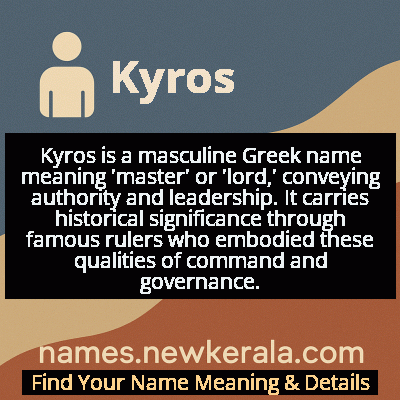Kyros Name Meaning & Details
Origin, Popularity, Numerology Analysis & Name Meaning of Kyros
Discover the origin, meaning, and cultural significance of the name KYROS. Delve into its historical roots and explore the lasting impact it has had on communities and traditions.
Name
Kyros
Gender
Male
Origin
Greek
Lucky Number
7
Meaning of the Name - Kyros
Kyros is a masculine Greek name meaning 'master' or 'lord,' conveying authority and leadership. It carries historical significance through famous rulers who embodied these qualities of command and governance.
Kyros - Complete Numerology Analysis
Your Numerology Number
Based on Pythagorean Numerology System
Ruling Planet
Neptune (Ketu)
Positive Nature
Intuitive, analytical, spiritual, and inquisitive.
Negative Traits
Secretive, reserved, aloof, and can be overly critical.
Lucky Colours
Green, yellow.
Lucky Days
Monday.
Lucky Stones
Cat’s eye, moonstone.
Harmony Numbers
1, 5, 6.
Best Suited Professions
Scientists, researchers, spiritual leaders, detectives.
What People Like About You
Depth of knowledge, analytical skills, spirituality.
Famous People Named Kyros
Cyrus the Great
Persian Emperor
Founded the Achaemenid Empire and established progressive policies of tolerance
Cyrus II of Armenia
Armenian King
Maintained stable rule as Persian satrap over Armenian territories
Cyrus of Panopolis
Greek Poet and Official
Influential Byzantine official and respected poet in 5th century Constantinople
Kyros Charalambous
Modern Musician
Popular Cypriot singer known for contemporary Greek musical innovations
Name Variations & International Equivalents
Click on blue names to explore their detailed meanings. Gray names with will be available soon.
Cultural & Historical Significance
The name's cultural journey reflects the complex relationship between Greece and Persia, two major ancient civilizations that both competed and influenced each other. In Greek usage, Kyros came to symbolize not just Persian power but the qualities of visionary leadership that transcended ethnic boundaries. The name maintained its prestige through Byzantine times and into modern Greek culture, where it continues to evoke images of historical greatness and leadership qualities. This enduring significance demonstrates how names can carry deep historical memories and cultural values across millennia.
Extended Personality Analysis
Individuals named Kyros are typically associated with strong leadership qualities, strategic thinking, and natural authority. The historical weight of the name suggests someone who is ambitious, visionary, and capable of inspiring others toward common goals. They often exhibit a combination of practical wisdom and idealistic vision, able to navigate complex situations while maintaining their core principles. The Cyrus legacy contributes to expectations of fairness, tolerance, and the ability to unite diverse groups—qualities that make Kyros-suited individuals effective in leadership roles where diplomacy and vision are required.
Beyond leadership, the name suggests intellectual depth and cultural sophistication. Kyros-bearing individuals are often perceived as having historical awareness and appreciation for tradition while being forward-thinking. They tend to be confident without being arrogant, possessing a natural dignity that commands respect. The name also implies resilience and the ability to overcome challenges through strategic planning rather than brute force. These personality associations make Kyros a name that suggests both strength and refinement, someone who can build lasting structures—whether social, professional, or intellectual—through a combination of vision, practicality, and ethical commitment.
Modern Usage & Popularity
In contemporary naming practices, Kyros occupies a niche as a distinctive classical name with strong historical roots. While not widely popular, it maintains consistent usage particularly in Greek-speaking communities and among families with appreciation for ancient history. The name has seen a modest increase in international usage as parents seek unique yet meaningful names with classical origins. It appeals to those wanting a name that sounds both ancient and modern, with the advantage of being recognizable but uncommon. In Greece and Cyprus, Kyros remains in steady use, often chosen to honor family traditions or historical connections. Internationally, it serves as an alternative to more common classical names, offering the same gravitas with greater distinctiveness. The name's modern usage reflects a balance between historical significance and contemporary appeal, making it suitable for parents who want their child to carry a name with depth and character without being overly common or trendy.
Symbolic & Spiritual Meanings
Symbolically, Kyros represents the ideal of enlightened leadership and empire-building vision. The name carries deep metaphorical meanings of creation, organization, and the establishment of lasting systems. It symbolizes the ability to bring order from chaos and to unite diverse elements into a harmonious whole, reflecting Cyrus the Great's achievement in building a multicultural empire. The name also embodies the concept of legacy—the idea that one's actions can have enduring impact beyond their lifetime. In a more personal sense, Kyros symbolizes self-mastery and the capacity to lead one's own life with purpose and principle. It suggests someone who can see the larger patterns in life and work toward grand objectives while maintaining ethical consistency. The symbolic weight of the name makes it particularly meaningful for those who value historical continuity, visionary thinking, and the responsible exercise of power and influence.

